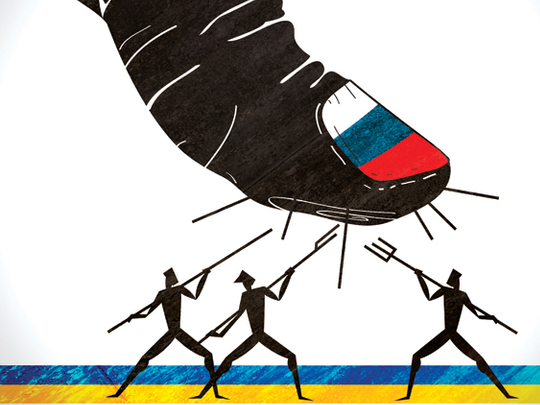
As foreign ministers from Russia, the United Kingdom, US and Ukraine held talks in Geneva on Thursday, Ukraine was stumbling towards civil war — the victim both of Russian President Vladimir Putin’s ambition and spite and of the West’s consistent failure to predict or counter his moves. All the signs suggest they are going to leave it too late once again.
First, let us be clear: Putin has no grand plan to reconquer all parts of the Soviet Union. (Wanting to create a common market with a few of them is hardly a crime.) But he certainly has other goals, scarcely less sinister, such as “protecting” what he describes as “the Russian world”. And he is a master in reacting to events, often created by the West, and turning them to his advantage. He will prise open any chink that allows him to further his aims and he will continue to do so if the West keeps pussy-footing around.
The European Union astonishingly failed to predict that Ukraine’s former president Viktor Yanukovych would turn away from a “partnership” deal that promised little money and lots of tough conditions. This gave Putin his first chance to make an opportunistic counter-proposal that cost, in Russian terms, small change. That in turn provoked the “Maidan” revolution and Ukraine’s decisive turn to the West. Once again, amid the mad cheering over the downfall of Putin’s supposed ally Yanukovych, no western leaders seemed to foresee what this would provoke. It should hardly have been a surprise that Putin’s first thought would be to secure his Crimean military base from Nato hands. He has more or less promised this for years. At that point, surely, the West should have taken steps to make absolutely sure that eastern Ukraine would not fall too. That required a big stick and big carrots too — or at least some subtle diplomacy. Instead, the West got utterly meaningless sanctions aimed at the wrong people (Putin’s big-business cronies do not determine his foreign policies).
This was accompanied by sneers and taunts intended only to rile Putin, such as US President Barack Obama’s comments about the Crimea annexation being the work of a “regional power” acting out of weakness. Was belittling the strongman meant to win him round? Ah yes, and then Obama sent his CIA chief to Kiev just to make sure the Russians got the point about where the new Ukraine was headed. Then Russia’s Foreign Minister, Sergei Lavrov, suggested that federalisation would help. Predictably he was scorned. But why? If ever a country needed some sort of major devolution of power it is surely Ukraine. The West should have had this idea first and insisted that its clients in Kiev got a move on — before it became branded as a Kremlin idea (and therefore became by definition worthless).
It needs to be made absolutely clear to Putin — even as the time for manoeuvre slips tragically away — that further military intervention (or disguised invasion) will be met not with more warnings, jeering and pointless sanctions, but with resolute western military support for Ukraine. Under the 1994 Budapest Memorandum, the UK and US are guarantors (morally, if not legally) of Ukraine’s territorial integrity. They should make clear that any attempt to dismember the country will be repulsed by force.
That is the big stick. And there needs to be a smaller one too: The threat of total isolation of Russia. Sanctions should be introduced with immediate effect against the people who matter — the entire political leadership (government, Duma, military, security services), plus their families. Visa bans and asset freezes on them all — that would really send a shock up the Kremlin spine. Economic sanctions are pointless and sanctions against Putin’s oligarch friends are meaningless gestures, winning braying applause in the West but laughed at in Russia.
Finally, the West must also offer some incentives. Western leaders should assure the Kremlin that they will press Kiev to devolve power in the regions and guarantee Russians’ rights. They should order President Oleksandr Turchynov to get rid of the far-rightists who inexplicably are in his government. (“Order” is a horrible word, but the time has passed when we could pretend Ukraine’s policies should be left to Ukranians; that will come later.) They should condemn the West’s darlings such as Yulia Tymoshenko when she is heard calling for Russians to be wiped out. And they should tell Putin to call on his proxies in eastern Ukraine to back down, leave all occupied buildings, drop the idea of a referendum and wait for the results of the May 25 election.
The West must also accept that Russia has legitimate security interests and rule out Nato membership for Ukraine for ever. In the long run, a global rethink of security is needed, to guarantee the West’s security together with Russia’s, not in opposition to it — but that cannot happen until after Putin leaves the scene.
— Guardian News & Media Ltd








